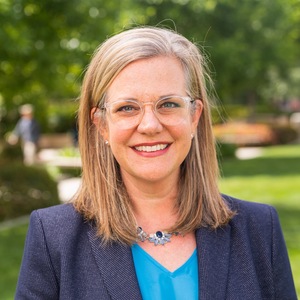Choose Love in the Deep

When someone asks you about your perceptions of singleness, what comes to mind first? It likely depends on your own relationship status or history, but maybe you think about loneliness, perhaps you think about independence, or you might even think of single people you know. Did you find yourself thinking about profound love, relational fulfillment, and community? As a single woman in my late 30s, that’s what I’ve been reflecting on lately around my singleness.
I have an extraordinary amount of love in my life. There are times when I feel that no one has been loved more or better than me. And there are also times when I feel an ache for love that is profound. I often wonder about the paradigm of relational fulfillment that is communicated through an explicit or implicit understanding of marriage as the “ultimate” human relationship. What does it mean to be loved well and to love others well as a single person? I’m not a fan of a “Jesus is my boyfriend/husband” ideology for singles, but I do love the idea of the sufficiency of Christ to meet my relational needs (both in Himself and through the people He brings into my life).
This past Valentine’s Day, I found myself contemplating a phrase by Christina Rossetti, “choose love not in the shallows but in the deep,” after getting this extraordinary card from a dear friend. This card made me cry, and was a sweet hug from someone who demonstrated love by sending it. The little blue asterisk referenced a handwritten note by my friend that said, “not that a partner is a prerequisite to happiness.” This friend wanted me to know that he thought I could be content without a partner, but he also knows that I have often desired to be married. It’s a tricky business, isn’t it? I want to be content, and often am, in my singleness, but I also want to be honest about my desires. A tiny part of me resented how much this card meant to me - that I feel that romantic love will validate my “lovability.” So what does it look like to choose love “in the deep”?
Because we all do have deep needs for love, right? Sometimes I hear rhetoric around singleness that sounds like, “I’m the kind of person who doesn’t look to anyone to meet my needs.” But to me, that doesn’t make any sense. Even on the most basic level, I need the people around me every day in order to survive: people at the grocery store who stock the shelves, my landlord who makes sure the water works in my apartment, my boss who creates an environment where I can thrive AND get paid (oh, and especially my local barista who provides my daily caffeine). Beyond that, I need my parents who know me better than anyone and pray for me daily, my dearest friends from college who create space for us to pour out our lives together in difficulty, the small group members at my church who check in on me when I am buried in doctoral coursework, and my colleagues at work who daily listen to and encourage me.
That list doesn’t even include my sweet nephews who cheer me on at ping-pong and give me great hugs, my sister-in-law who sits with me for long talks over gourmet donuts, my brother who takes me out for Italian and makes me laugh until my side hurts, the friends I made travelling internationally who inspired me to greater adventures, my steadfast high school friends with whom I always celebrate birthdays and holidays, and the extraordinary women who are walking through doctoral coursework with me! Oh, and educators who’ve poured into me, pastors who have taught me, peers who have studied with me, employees who have worked with me, neighbors who have walked miles with me, and musicians who’ve ministered with me. You probably see where I’m going...These individuals (and many more) form a constellation of relationships that God has used to place love and belonging in my life and remind me that I am not alone. What if we believed that this amount of human love is enough? What if married couples similarly depended upon this more holistic vision of human love? What if we then grounded that human love in deep contentment found in Christ alone?
As I have been pursuing research related to the influential relationships that shape leaders’ development, particularly women in leadership, I have found research that demonstrates the importance of multiple relationships in the development process.¹ Rather than one particular mentor or coach, leaders attribute their career development and success to a network of influential relationships. What might be the implications of this research if applied to life satisfaction more broadly, and the community God intends for us?
Jesus Christ is my first love. This statement is often made in blogs on singleness, and I don’t know how to make it sound less trite. It is a weighty, profound truth, and should be true for all of us as Christians, married or single. Perhaps in my singleness I can demonstrate the sufficiency of Christ differently than a married person, but I’m less and less convinced that’s the case. I think, perhaps, I can demonstrate the sufficiency of the family of God and human relationships differently than a married person. I have had married friends tell me that there is no greater loneliness than the loneliness that they have experienced in marriage. Maybe I can help remind married people of their deep need for human relationships beyond their spouse. After all, “people will neither marry nor be given in marriage” (Matthew 22:30) at the resurrection. I recognize that the journey is different for everyone and am wary of giving advice, but a few thoughts come to mind as we seek to live in love more fully:
-
Steer clear of rhetoric that would tell you love in marriage is the only form of deep love. Marital love is special and beautiful, but you can be and are loved richly as a single person, and marital love is fuller when you are surrounded by an intentional community.
-
Reflect on the constellation of relationships God has placed in your life, and nurture those relationships.
-
Consider new possibilities for giving and receiving love. What love is already in your life that may only be “in the shallows” right now? Could it become deep?
¹ Marcinkus Murphy, W., & Kram, K. E. (2010). Understanding non‐work relationships in developmental networks. Career Development International, 15(7), 637–663. doi:10.1108/13620431011094069; Van Emmerik, I. J. (2004). The more you can get the better: Mentoring constellations and intrinsic career success. Career Development International, 9(6), 578-594.


